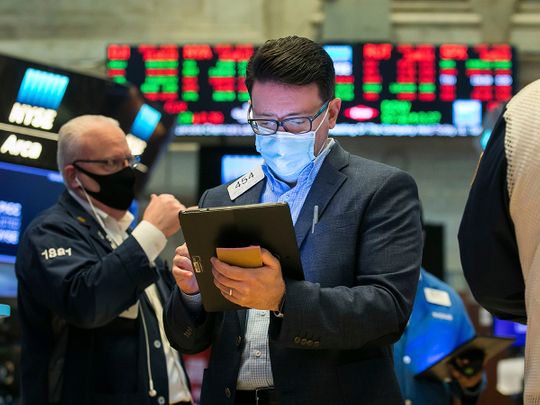
Dubai: Global stocks are expected to remain under an increasing amount of selling pressure after the US central bank meeting last week set off ripples in stocks, bonds and currency markets.
The US Federal Reserve signalled that it was discussing moving toward tapering its bond-buying program, and the fact that it is looking to step away from some of its easy policy has alarmed investors worldwide and triggered a sell-off across the board. This is seen as a trading theme in the weeks ahead.
Uncertainty heightened
That uncertainty has heightened the focus on the Fed and inflation, so comments from Fed Chairman Jerome Powell on Tuesday will be important in the coming week as well.
The latest move is the first serious reversal of the easy policies the monetary regulator had put in place to add liquidity to markets when the economy shut down last year because of the health crisis.
The purchases, which amount to $120 billion a month, would be gradually tapered away once the Fed decides to slow down and end the bond buying, or in other words the quantitative easing. That could then open the door to interest rate hikes, which the Fed now projects would come in 2023.
Should investors buy or sell?
When it comes to whether or not investors should buy stocks currently, markets experts are of the opinion that with stocks expected to come down a little more in the coming days, it will present an opportunity to start buying again then.
The Federal Reserve meeting on Wednesday turned financial markets turbulent. The dollar jumped, stocks fell and bond yields moved to imply higher short-term interest rates in the future.
That information moved all asset classes this week, especially commodities (except for oil), as the US dollar continued to climb against other major currencies. Since most commodities are prices in dollars, steep drops were witnessed in copper, steel, lumber, and palladium, to name a few.
Stocks on downward trend
Among the US benchmarks, the Dow fell 3.5 per cent, recording its worst week since October. The S&P 500 was down 1.9 per cent for the week, its worst weekly loss since February, and the Nasdaq lost just 0.3 per cent.
Multiple analysts are warning that the market sell-off probably isn’t done, while cautioning investors that it will persist into the week ahead.
With the Fed currently in warning mode, that can be brutal for markets, with the added fact being that late June is generally a tough time for stocks, when historically analysing stock market data.
After a challenging week for equity investors, next week looks relatively quiet on the corporate calendar but heavy on economic data.
Key US inflation data ahead
In the US, there is also key inflation data late in the week ahead, when the Fed’s preferred inflation measure, the personal consumption expenditures inflation index, is released.
Investors will approach the second half of the year knowing the Fed’s projections on inflation, which now stand at 3.4 per cent, as well as its intention to raise interest rates twice in a couple of years.
Elsewhere, market experts also evaluate how while the Bank of England is not expected to change policy at its decision this week some commentary around how it sees the growth and inflation outlook for the UK will be worth looking out for.
But, like the US central bank, many are expecting the BoE to indicate that it, too, plans to hike interest rates at least twice in 2023.








